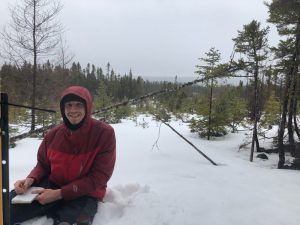I finished my PhD at Florida International University in 2018 and soon after joined BBERG here at Memorial University. My previous research has focused on controls of fire derived carbon en route from terrestrial to coastal environments and implications for coastal biogeochemical cycles. In addition, my research has focused on understanding human impacts on fluvial carbon transport in terrestrial systems. Since joining BBERG, my active research projects have centered around (1) climate related controls on terrestrial to aquatic carbon fluxes in boreal forests and (2) understanding the fate of terrestrial organic matter at the land to sea interface. Within this context, I specialize in the chemical characterization of dissolved organic matter (DOM), a significant vessel for carbon and nutrient transport in aquatic systems. The composition of DOM across various environments is unique and provides a series of chemical clues that tell us about the origins, transformations, and fate of organic carbon within the aquatic realm. Analytical characterization of DOM is challenging, but we can describe unique aspects of DOM behavior using several different tools. My specialties in DOM characterization primarily include the use molecular spectroscopy (UV-VIS Absorbance and Fluorescence), lignin phenol and amino acid biomarkers, NMR Spectroscopy, and ultra-high resolution mass spectrometry.
Boreal regions are warming at an alarming rate. Precipitation patterns and water movement throughout the landscape are also being affected by climate change. My current research goals are to use DOM as a proxy to understand how these shifting climate regimes are impacting carbon transport and biogeochemical cycles in boreal regions. Furthermore, changes in the timing and delivery of DOM from the terrestrial landscape is expected to influence the quality of DOM and nutrients delivered to coastal regions. My research focus in this area is driven by a desire to understand how sources and transformation pathways for DOM in estuarine systems are changing across spatial and temporal scales and the implications for coastal benthic communities and microbial food webs.
Recent Publications:
J. Alan Roebuck, Jr., Michael Seidel, Thorsten Dittmar, Rudolf Jaffé. 2019. Characterization of dissolved organic matter in fluvial systems: Linking land use to the River Continuum Concept. Environmental Science & Technology. doi: 10.1021/acs.est.9b04605
Joseph D. Felix, J. Alan Roebuck, Jr. Ralph N. Mead, Joan D. Willey, Gene B. Avery, Robert J. Kieber. 2019. Methanol and ethanol concentrations in a Greenland ice core: Implications for atmospheric oxidation chemistry. Atmospheric Environment, 217 (15), doi: j.atmosenv.2019.116948
J. Alan Roebuck, Jr., Patricia M. Medeiros, Maria L. Letourneau, Rudolf Jaffé. 2018. Hydrological controls on the seasonal variability of dissolved and particulate black carbon in the Altamaha River, GA. Journal of Geophysical Research: Biogeosciences, 123, 3055-3071
J. Alan Roebuck, Jr., Michael Seidel, Thorsten Dittmar, Rudolf Jaffé. 2018. Land use controls on the spatial variability of dissolved black carbon in a subtropical watershed. Environmental Science & Technology, 52 (15), 8104-8114
